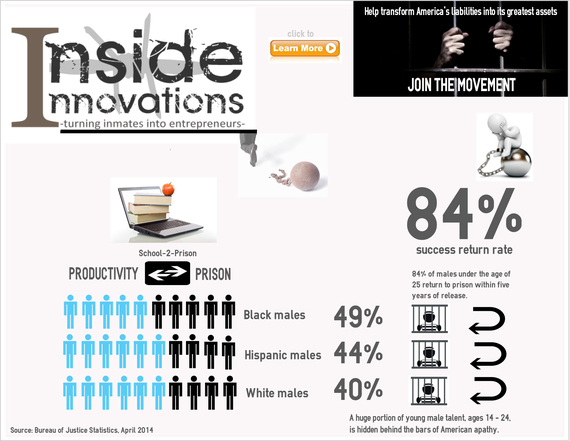Each year, a cohort of more than 600,000 students will leave the chambers of Criminal University (a.k.a. Criminal U or prison). Young men, ages 18 to 25, have the highest probability of returning to this archaic institution that doles out punishment 24 hours a day. According to the latest statistics released by the U.S. Department of Justice, 84 percent of young male inmates released will return to Criminal U within five years.
This Prison-2-Prison pipeline is fed by an insidious School-2-Prison pipeline that will touch the lives of nearly half of America's black and Latino males and 40 percent of white males. The numbers are astounding:
Once enrolled in Criminal U, the odds are overwhelmingly in favor of the Prison-2-Prison Pipeline, with 84 of every 100 expected to come back to their tiny dorm cage behind barbed wire fences surrounding the campus. Consider how many crimes will be committed by mostly non-violent offenders who have not discovered a better way to cultivate their talents, pursue their aspirations and succeed in dysfunctional environments that permeate every nook and cranny of poverty-stricken communities that are disconnected from wealth-generating ecosystems right next door.
The lessons these men learned inside Criminal U will bring almost all of them back. They will grow from young to middle-age without escaping the Prison-2-Prison pipeline. And two-thirds of middle-aged inmates will still return to Criminal U upon release. The numbers don't lie.
"Prison don't teach motherf*%#^s how to stop what they doin," an inmate said. "They teach you how to do it better."
Those words seared the soul of Andrew Scot Bolsinger during his indoctrination into Criminal U. Bolsinger is a prolific writer, award-winning journalist and entrepreneur whose recklessness and addiction ran his life right off the rails just when all those around him thought he was a picture of success.
"It was a mirage," he says.
Bolsinger is five years sober now. He's out of prison and rebuilding his career by pouring time into one goal: "I try to be a part of the solution. I owe that much after being such a big part of the problem," he says.
Bolsinger launched a prison-reform website called "Criminal U." Every day he posts about the education many receive behind bars and the opportunities to use that education for good instead of continued criminality. He has already had an impact, reaching out to those on death row and connecting with families nearly broken by the criminal justice system.
"Each time you write I feel hope renewed," one father of a teenager facing life behind bars told Bolsinger after they connected through the Criminal U website.
Bolsinger writes inmates and encourages their families. He helps those getting out of Criminal U to get off to a good start. Asked why he volunteers so much time, he offers the same refrain:
"I try to do the right thing. Then do the next right thing. By doing that, I hope to be part of the solution," he says.
Part of that solution is an innovative program Bolsinger co-founded that seeks to train inmates to become tech-entrepreneurs: Inside Innovations.
When Bolsinger emerged from the darkness of Criminal U, he found a society he didn't recognize. Technology and innovation had disrupted old business models, introduced new products, platforms and societal behaviors. He'd only been gone a few years.
Tony Yarbough had been trapped inside Criminal U for two decades, since he was a young teenager, for a crime he didn't commit. The DNA evidence exonerated him. But the system of jurisprudence that had wrongfully convicted him also quarantined him from any awareness of how fast society was changing. When Yarbough was tossed inside Criminal U, there was no Facebook or Twitter or smartphones. When the slothful system of release reluctantly set Yarbough free, he stepped into a foreign country where people stared at screens of all sizes, and where technology was the foundation upon which all economic opportunity was built.
Yarbough was lost. Bolsinger found him.
It was this shared experience of being lost in a vaguely familiar foreign land that led Bolsinger to do something that has never been done anywhere in any prison in the nation. He decided to help inmates, prior to their release, become knowledgeable about the innovation economy and receive exposure to the same tech-innovation activities, like hackathons, that fuel entrepreneurship among students in high schools and colleges. After writing a business plan, Bolsinger presented the idea to the re-entry board of the state of Oregon last month. It was well-received.
The success of Inside Innovations will empower newly released inmates to find new pathways, new networks and new pursuits toward entrepreneurship using tech-innovation as a foundation. The idea is to go inside the barbed wire fences of Criminal U and provide inmates with insights and understanding of the innovation economy, new markets, new business models, new startup processes and new opportunities that aren't being offered in the communities to which they are likely to return. Through this new program, released inmates could pursue entrepreneurship, using critical-thinking and problem-solving skills that will also benefit prospective employers.
Solutions. Change. Hope. These are the words that Bolsinger, a recovering alcoholic, focuses on daily. He saw the flood of the school-to-prison pipeline first-hand. He also saw the raw talent and skills in the men who wore matching clothes with "inmate" stamped across their chest.
Bolsinger says:
The talent in Criminal U is amazing. The entrepreneurial vision is bursting through the cellblocks. These are people who know life's odds are stacked against them. And they are determined to find a way to succeed. For some, it's through crime. For many others, it's hope in something else. I want to help them find the something else. The potential return on investment for society is to take those who cost the state the most and turn them into workers, taxpayers, innovators and job creators. It can be done. It needs to be done. It will be done.

